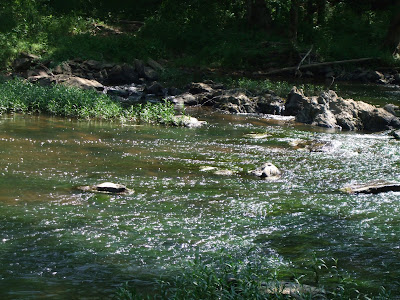

 Now is the time of year when, back in Decatur, I would be preaching at my cousin Cheryl's church in Jackson, GA, while she attended the Wise family reunion. Alas. Instead I'm unlikely to travel back there this long journey. We spoke about this back in March. She may or not travel herself to Alabama to hob nob with the relatives. I am content, though to be here in Durham, even though without church of my own and far from my family (as is Jami also). I am content that Cheryl and I, even though far apart, share a corpuscle in our blood that is Wise. It is enough that this deep of a connection spans the miles for us, as I am sure that she is heartened also, that though her cousin is distantly residing, still there beats a shared molecule, a lone survivor, an emblem of all that being Wise stands for, that like the yellow flowers that dot our lawns in spring, that dandy miracle, declares its joy even when overwhelmingly rarefied.
Now is the time of year when, back in Decatur, I would be preaching at my cousin Cheryl's church in Jackson, GA, while she attended the Wise family reunion. Alas. Instead I'm unlikely to travel back there this long journey. We spoke about this back in March. She may or not travel herself to Alabama to hob nob with the relatives. I am content, though to be here in Durham, even though without church of my own and far from my family (as is Jami also). I am content that Cheryl and I, even though far apart, share a corpuscle in our blood that is Wise. It is enough that this deep of a connection spans the miles for us, as I am sure that she is heartened also, that though her cousin is distantly residing, still there beats a shared molecule, a lone survivor, an emblem of all that being Wise stands for, that like the yellow flowers that dot our lawns in spring, that dandy miracle, declares its joy even when overwhelmingly rarefied.I have not preached in a while and I'm getting itchy. I am distraught that I did not get to preach any of my Easter sermons, and each week I make a stab with exegeting some text. Today's texts provided some wonderful fodder: Noah getting the animals on the boat with a 2 by 2 or a 2 by 7, along with all "creepy" things (as the text says); the house built on the sand and its dramatic declension in that ancient housing bubble; and a faithful passage from Romans, where Paul says that he'd rather not boast. I drew a magnificent bit of baroque cross, a cross between celtic and anastazi. I liked the comparison and contrast between the flood passage in Genesis and the flood passage in the parable concluding the Mount's Sermon. As good as the house made of rock on the rock was, I ponder how remarkable an engineering feat it would be to sustain the sandy house through such a deluge. Concrete is indeed (and Rome is built not of marble but concrete) sand, in Roman times a volcanic sand, made rock, and made rock peculiarly in water. At Georgia Tech, one of that engineering school's campus competitions revolves around the problem of making a concrete boat. Can you imagine, making an ark of sand that when the rains came down concretized and then floated improbably away. And the house made of rock? What was its equity? Indeed it's made of rock, but what of its location? What of the market? Can you imagine mishandling the financing of the rock house, that perhaps on a rainy day you watch it being demolished to put an even larger house on the lot, only to witness a concrete house filled with animals sail right by you. Creepy things would be afoot.
Vincent Price made a creepy movie about a dismembered hand seeking out victims; a sequel where a cut off foot went around kicking people didn't engender an equivalent effect. The one with the dismembered ear, listening in on conversations, thankfully ended the series.
I see a vision of dismembered hands, feet, ears and eyes, joining viscera and lifting up voice on a hill top - much as in the Tom Waits song "Eyeball Kid". The eyeball kid didn't have a mouth and couldn't even blink but he came here to teach us how to really see. And that's the message I took away from this Sunday's sermon: that we all have a part but we're not apart.














